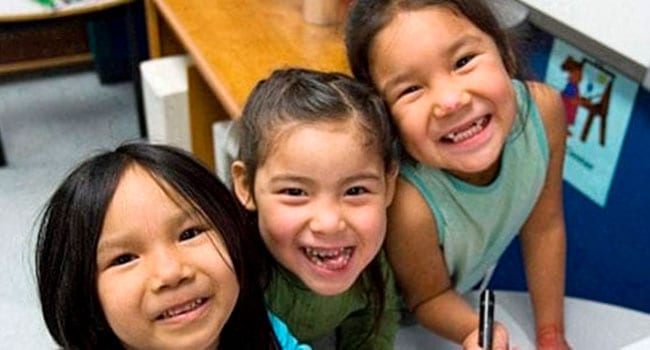 The Truth and Reconciliation Commission of Canada called upon governments to make the teaching of Indigenous languages in public schools a priority.
The Truth and Reconciliation Commission of Canada called upon governments to make the teaching of Indigenous languages in public schools a priority.
No one would disagree with the idea of having more Indigenous people become familiar with their ancestral languages.
Many Canadians want their children to learn their ethnic languages. Parents with Scottish roots might want their children to learn Gaelic to help instil ethnic pride, or for many other equally valid reasons. It’s not surprising that many Indigenous parents feel the same way.
However, there are many practical reasons why the public school system is not the place in which to do this. One is that there are so many different languages that would have to be accommodated.
Canada is a very multicultural country. In Japan, it could be assumed that almost all students share an ethnic identity. But in our country, the Scottish-Canadian child shares a classroom with children from a multitude of other ethnic groups. In fact, the chances are good that the Scottish-Canadian child is also Mennonite-Canadian, Irish-Canadian and Indigenous-Canadian. Most Canadians are a mishmash of cultures, religions, races and ethnic identities.
Therefore, the use of public schools to teach ethnic languages is problematic.
Teaching such languages, then, is better done by parents and ethnic associations, a fact long recognized in this country.
Things are further complicated by the fact that there are at least 60 distinct Indigenous languages in Canada. Designing a practical way to teach all of these languages in public schools would be insurmountable.
Even in a First Nation community that shares only one ancestral language, there are good reasons why the limited resources available in the public school system should not be diverted to the teaching of ancestral languages.
Indigenous children need all the help they can get in the basics, such as English, math and science. Since records have been kept, Indigenous children have lagged far behind the mainstream in academic achievement. This profoundly influences their ability to get a job when (and if) they graduate.
It would be a mistake to divert limited resources in the public school system to something of such limited value as fluency in an ancestral language. Emphasis should be put on providing a solid grounding in the basics.
Even if fluency in an Indigenous language is achieved by a few, problems remain. It would be difficult to maintain that fluency because so few people still speak those languages. And what would be achieved by learning the language?
Those languages are about as relevant today as Latin. The ancestral Indigenous languages had their origin – and worked very well for thousands of years – in a subsistence hunting and gathering lifestyle that’s now a thing of the past. They simply don’t work in the modern world.
They have no words for ‘computer,’ ‘airplane’ and the like because those inventions were not part of their world. The dozens of words they may have had to describe different snow conditions to people on the hunt are only of relevance to a tiny, and diminishing, audience today.
Fluency in an ancestral language might be very valuable to that child and family for personal reasons. But even if it’s achieved, it would not help the child succeed in the future. And if fluency is achieved at the expense of gaining a good education, it would actually be a negative.
Pride in one’s culture is a good thing. We should all know where we come from and feel good about it. However, the public school system isn’t the best vehicle to use to instil that pride. Parents, community groups and ethnic associations are better sources.
Governments should instead commit to providing the best possible education for all Canadian children, with a particular effort to close the gap between Indigenous children and the mainstream.
Brian Giesbrecht is a retired judge and senior fellow with Frontier Centre for Public Policy.
The views, opinions and positions expressed by columnists and contributors are the author’s alone. They do not inherently or expressly reflect the views, opinions and/or positions of our publication.



The issue here is that the Canadian pedagogy is skewed towards colonial thought and thus is not essentially “core subjects”. It’s just what Western, colonial thought deems is best and purports this sense of superiority over not only ethnic identities from outside of Canada but especially over Indigenous pedagogies and traditions.
For instance, many schools in Canada teach French as a second language, even offering up different levels of language immersion. After all, French is Canada’s second official language. While I grew up learning French and believe speaking any language is a great asset, why is a colonizer’s language more important than that of the Indigenous peoples upon whose land we occupy? It would make more sense to learn Indigenous languages in school precisely because what we call ‘Canada’ is stolen land from the Indigenous peoples. The excuse that ‘there are just too many’ is simply invalid. Just because it’s too complicated to fathom means we shouldn’t do it at all?
The idea that governments should provide the ‘best possible education for all Canadian children’ is only another indicator of this article’s sense of Western superiority. Why is what we think is best, actually the best? The notion that a primarily white government, working to govern a nation built upon colonialism actually knows best for its diverse citizens is just bizarre.
This article only excuses colonial practices in the Canadian educational system and should be evaluated – especially put into context with everything in discussion these days with ethnocentrism, cultural relativism and multiculturalism.
The issue here is that the Canadian pedagogy is skewed towards colonial thought and thus is not essentially “core subjects”. It’s just what Western, colonial thought deems is best and purports this sense of superiority over not only ethnic identities from outside of Canada but especially over Indigenous pedagogies and traditions.
For instance, many schools in Canada teach French as a second language, even offering up different levels of language immersion. After all, French is Canada’s second official language. While I grew up learning French and believe speaking any language is a great asset, why is a colonizer’s language more important than that of the Indigenous peoples upon whose land we occupy? It would make more sense to learn Indigenous languages in school precisely because what we call ‘Canada’ is stolen land from the Indigenous peoples. The excuse that ‘there are just too many’ is simply invalid. Just because it’s too complicated to fathom means we shouldn’t do it at all?
The idea that governments should provide the ‘best possible education for all Canadian children’ is only another indicator of this article’s sense of Western superiority. Why is what we think is best, actually the best? The notion that a primarily white government, working to govern a nation built upon colonialism actually knows best for its diverse citizens is just bizarre.
This article only excuses colonial practices in the Canadian educational system and should be evaluated – especially put into context with everything in discussion these days with ethnocentrism, cultural relativism and multiculturalism.